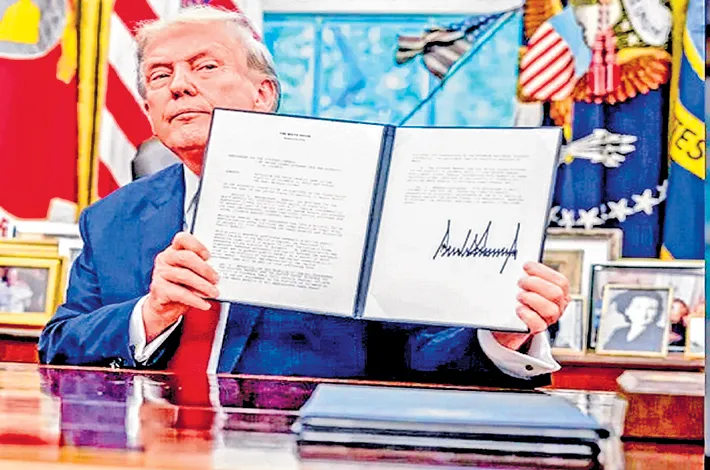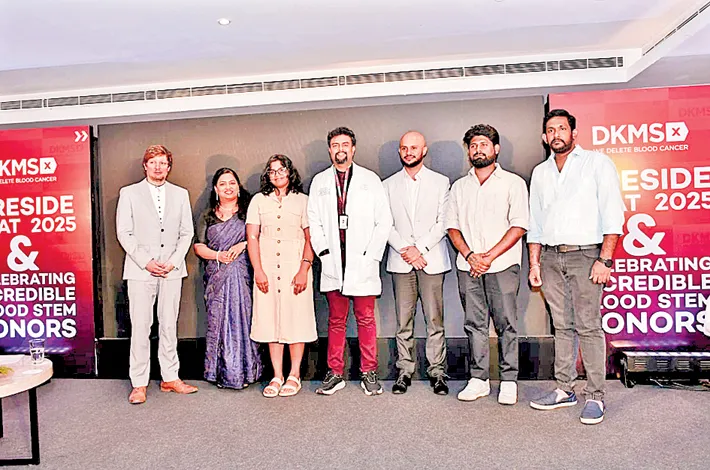15% CAP ON INT’L STUDENTS!
07-10-2025 12:00:00 AM

Indian Students’ “American Dream” Collapsing?
The 5% cap per country means many Indian students will be forced to explore costlier alternatives. More importantly, the Trump admin indirectly asks international students to uphold “American and Western Values” or face deportation.
The Trump administration has told US colleges to limit international undergraduate students to 15% of their total enrollment, according to a 10-point memo shared by the White House. On the other hand, the American Council on Education (ACE), along with 53 other higher education associations, has called on the Department of Homeland Security (DHS) to withdraw a proposed rule that would impose fixed time limits on visas for international students and scholars.
The White House is asking nine major universities to commit to President Donald Trump’s political priorities in exchange for more favourable access to federal funding. The universities were asked to sign a “Compact for Academic Excellence in Higher Education”, which outlines the government’s vision for America’s campuses.
The compact asks schools to adopt policies on admissions, women's sports, free speech, student discipline, and college affordability. Signing the agreement would give universities priority access to federal grants and White House events, though funding would not be limited solely to signatory schools.
Key Requirements
Cap international undergraduate enrollment at 15%, with no more than 5% from a single country.
Limit tuition increases for U.S. students for five years, with the wealthiest campuses potentially offering free tuition for students pursuing “hard science programs.”
Commit to promoting free speech and a wide range of viewpoints on campus, including reforming units that are perceived to punish or marginalise conservative ideas.
Follow the government’s definition of gender for bathrooms, locker rooms, and women’s sports teams.
Stop considering race, gender, or other demographics in admissions, while requiring SAT or ACT scores for undergraduate applicants.
Each school must also commission an annual survey of students and faculty to evaluate adherence to the compact. The Justice Department would enforce compliance, with penalties including loss of benefits for one to two years in cases of violations. The compact notes that universities can choose different models and values, but would forgo federal benefits if they do so.
Letters seeking agreement and feedback were sent to universities, including Vanderbilt, Dartmouth, MIT, Brown, University of Pennsylvania, University of Southern California, University of Texas, University of Arizona, and University of Virginia.
In a contrasting development, the American Council on Education (ACE), alongside 53 other higher education associations, has urged the DHS to withdraw a proposed rule that would impose fixed time limits on visas for international students and scholars.
Fixed Time Limits
International students are currently allowed to remain in the US for the "duration of status" of their academic programs. The new DHS rule would substitute this with fixed time periods, requiring students or scholars to seek renewals if their research or studies take longer than the initial period.
Students have expressed concern over this change. An Indian student pursuing a master’s degree in Computer Science in New Jersey said on the condition of anonymity, “This feels stressful. Most of us plan our higher education with the idea of flexibility; sometimes programs take longer, sometimes research needs more time. A strict four-year cap could add pressure and uncertainty.”
Another student pursuing a master’s in business in California highlighted the challenges of program restrictions. “I understand the government’s point about oversight, but not allowing program or major changes in the first year seems unfair. Many students realise after a semester that their chosen major isn’t the right fit,” he said.
A PhD candidate from Japan in Biology studying in Texas pointed to the difficulties for research-based programs. “For research degrees like PhDs, four years is rarely enough. Extensions may be possible, but the extra paperwork and approvals could discourage international students from choosing the U.S. at all,” the student explained.
ACE and its allies maintain that such limitations would pose hindrances for foreign students, potentially deterring high-ability candidates from opting for American institutions. In a joint letter, the groups warned that the rule could disrupt students’ academic timelines and reduce the competitiveness of the US in global higher education.
Impact on US Higher Education
International students are a major source of income for academic campuses, and in addition to financial contributions, they also bring cultural exchange. Associations emphasised that stringent visa restrictions are not supportive of the realities of academic research and learning, which in most cases transcend given time frames.
The group called on DHS to rescind the rule, citing possible administrative costs for students and institutions, and encouraging the need to make the US remain desirable to talent from around the world.
The proposal is still pending review, and DHS has not yet made its final determination. If put into effect, it would impact thousands of foreign students and scholars who come to study and do research in the United States every year.








